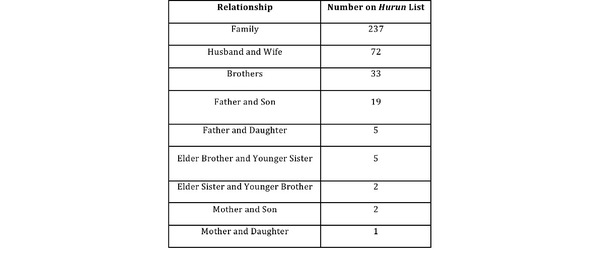
In the second presidential debate of 2012, both candidates engaged in some standard China-bashing, claiming to be tough on China without actually explaining why that was desirable. (For the record, Mr. Romney's claim that "there's even an Apple store in China that's a counterfeit Apple store, selling counterfeit goods," is not particularly accurate. Fake Apple stores in China may not be authorized Apple resellers, but the Apple products they sell are generally genuine, though they may be grey market and/or reimports.) The highlight of the evening, Gov. Romney's claim to have asked for "binders of women," seems, in addition to having created a gloriously silly Internet meme, to have been a stretch of the truth. But, on the subject of China -- and women -- what about binders full of Chinese women?
As I blogged about earlier, the Chinese equivalent of Forbes recently published its list of the richest thousand people in China. In 2011, only 156 of the 1,000 wealthiest Chinese were women. That is under 16 percent and barely a binder-full. According to Forbes, however, it is significantly better than the world average of 8.5 percent women for dollar billionaires and better than the 45 out of 400 (11.3 percent) that women hold on Forbes' list of the richest Americans. This difference is already stark enough, but when one considers that only seven out of those 45 are self-made, the gap widens further. The three richest women on the Forbes 400, for example, include the widow of Steve Jobs, the widow of the son of Wal-Mart founder Sam Walton, and the granddaughter of the founder of Mars candy. The percentage of self-made women on Hurun's list is undoubtedly much higher for the simple reason that fortunes in China have not been around long enough for many to have been inherited. Forbes list of the 100 wealthiest people in China, for example, only includes eight women, but six are self-made. Additionally, on the specific rich list for Shanghai, historically China's most progressive city, women made up 23 percent of the 82 richest people. What this means globally is that "[m]ore than half the world's richest self-made women are Chinese."
Percentage of Women on Various "Rich Lists"
Do women in China really do that much better relative to their American counterparts? One of the few policies about which the Chinese Communist Party has been relatively consistent since taking power has been their insistence that "women can hold up half the sky (妇女能顶半边天)." There is little doubt, however, that Chinese women still suffer discrimination in many settings. For example, Indiana University sociologist Ethan Michelson has found that while "employment opportunities for women lawyers have greatly expanded quantitatively, their careers are qualitatively less successful than those of their male counterparts in terms of both income and partnership status." Yet, he and I agree that there seems to be a phenomenon by which the most successful women lawyers tend to be able to outshine even their best performing male counterparts. A female partner I interviewed, for example, made around $115,000 in a part of rural Hunan where the average per capita income was under $500 per year. This probably made her the highest-earning lawyer in the county, if not the whole prefecture. Women in China seem to do especially well if they manage to get past the glass ceiling. Perhaps this is explains the relative prevalence of women on China's rich lists.
The Chinese version of the Hurun list also contains information on the relationship between family members that share a fortune. While most of the 1,000 billionaires are listed as individuals, the breakdown below shows that much of the wealth is spread over families or husband-wife teams. But women do seem to fair worse in general, and, there are far more pairings in which the man is the senior partner: five father and son combos versus two mother and son ones, and five elder brother and younger sister pairings compared to two elder sister and younger brother ones.
A woman's chances of making it onto a Chinese rich list might be better than an America woman's of making it into one of Governor Romney's binders, but if being a woman is not a particularly good way to join the ranks of China's billionaires on the list, what is? My next post will show that certain industries and, perhaps more surprisingly to Westerners, certain hometowns dominate the Hurun rich list.

